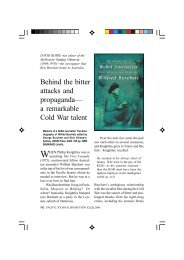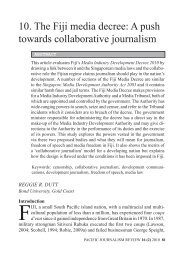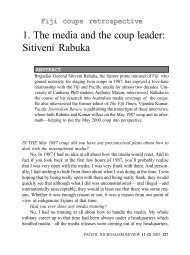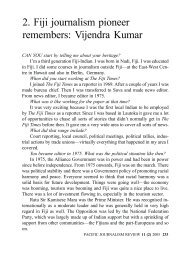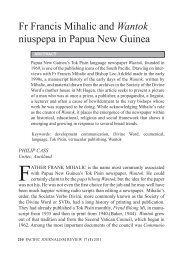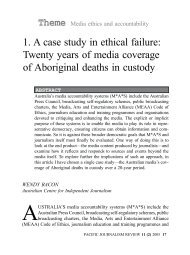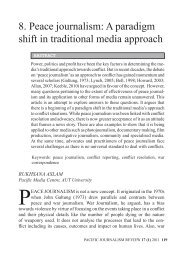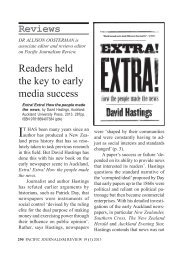Article Fiji's coup culture 1987-2006 - Pacific Journalism Review
Article Fiji's coup culture 1987-2006 - Pacific Journalism Review
Article Fiji's coup culture 1987-2006 - Pacific Journalism Review
You also want an ePaper? Increase the reach of your titles
YUMPU automatically turns print PDFs into web optimized ePapers that Google loves.
REBUILDING PUBLIC TRUST<br />
the French government, which was then denying its indigenous people the<br />
right of self-determination (p. 238). Even the allegations that French aid was<br />
diverted to the military failed to attract the attention of the Fiji media. Robie<br />
was critical of the sections of the Fiji media for allegedly compromising the<br />
principles of journalism:<br />
It is indicative of just how complete was Rabuka’s control and manipulation<br />
on the news media that these developments passed generally<br />
without comment or criticism. The Fijian news media, particularly<br />
Radio Fiji and the vernacular newspaper Nai Lalakai (part of The Fiji<br />
Times), justified the military build-up as a measure to counter supposed<br />
internal and external threats. In one Nai Lalakai article prepared by the<br />
military, democracy was dismissed as ‘trickery of the devil’ and the<br />
Fijians were urged to ignore the educated elite. (Robie, 1989, p. 239)<br />
Some senior Fijian journalists were named as alleged sympathisers and propagandists<br />
for the Taukei Movement while others were prepared to stick to the<br />
principles of fair journalism (Ibid). The old Fiji Sun, which decided to close<br />
down, was hailed as a brave paper that was prepared to stand up for truth<br />
and social justice. Rabuka not only manipulated and used media during the<br />
<strong>coup</strong>, but he began his <strong>coup</strong> with the use of the government’s information<br />
ministry’s news mechanism.<br />
The then Permanent Secretary for Information in the Fiji government,<br />
Peter Thomson (1999) relates a somewhat lighter and hilarious incident<br />
on the day of the <strong>coup</strong> when he was sharing grog (kava) in a nearby office<br />
which was next to Parliament. He saw soldiers and dismissed them as being<br />
on some sort of civil defence exercise. Later, while deep in conversation, the<br />
door of the office was kicked open and gas-masked soldiers burst into the<br />
room, formed half a circle around the open door and trained their guns on their<br />
stunned gathering. In stepped Lieutenant-Colonel Sitiveni Rabuka, wearing a<br />
grey lounge suit with sulu vakataga, polished military sandals and striped tie,<br />
and sporting a handlebar moustache. He asked for Peter Thomson, with the<br />
audience staring in stunned silence. When identified, Thomson was directed<br />
back to his office and Rabuka ordered him to issue a press release. He related<br />
that Rabuka dictated while his fingers flew across the paper,<br />
The Royal Fiji Military Forces have taken control of the Fiji government<br />
to prevent any further disturbance and bloodshed in the country.<br />
170 PACIFIC JOURNALISM REVIEW 18 (2) 2012



